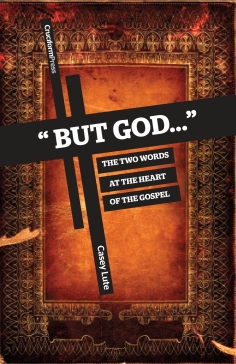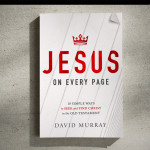I am in love with a little publisher called Cruciform Press. This publisher is a recent company on the scene of Christian books, but has quickly built up a library of material that is well worth our time. Their entire purpose is to publish God-glorifying books with solid theology yet at a very short length. Of the books I’ve seen, they’re often around 100 pages or less.
books, but has quickly built up a library of material that is well worth our time. Their entire purpose is to publish God-glorifying books with solid theology yet at a very short length. Of the books I’ve seen, they’re often around 100 pages or less.
One book that I’ve had my eye on for awhile is called “But God…”: The Two Words at the Heart of the Gospel by Casey Lute. This book certainly did not disappoint, and I highly recommend it to anyone interested in the subject matter (you can find it here).
What follows now is not such much a review nor a synopsis of the text, but just a small sampling of what the book contains. My hope is that you will learn something from this short post, that you would be motivated to pick up a copy of the book, and that this interaction might help me remember some things myself! Much of – if not all – of what follows I owe to Casey and this book.
—–
Many people are familiar with the text from Romans 5:8, which reads: “…but God shows his love for us in that while we were still sinners, Christ died for us.” I’d imagine this passage is what sparked Casey’s desire to write a book called “But God…” In the passages leading up to this verse, the Apostle Paul is making the observation that for an unrighteous person no one would dare die, yet perhaps for a righteous person (as Mr. Lute observes, this might be better read the righteous one) one might die for them. Yet, in Romans 5:8 Paul tells us “BUT GOD,” God acts on our behalf and always does. He is always the initiator.
The purpose then of this little book is to observe many places in Scripture which follow the “But God” pattern. There are 9 detailed examples in all (one of them being Romans 5:8) – I am going to highlight two of them below.
God Preserves Humanity (Chapter 1)
The first example Casey gives is of the story of Noah and the flood. Mr. Lute compares this story to climbing a trail on a mountain; it ascends to the main point, and then descends again (pg. 11). Even though the whole story is important, there is one single climaxing point.
Mr. Lute points to Genesis 8:1 as the climax of the account of Noah. It reads: But God remembered Noah and all the beasts and all the livestock that were with him in the ark. And God made a wind blow over the earth, and the waters subsided. Casey points out that this is the point of the story; Mankind deserves destruction, BUT GOD remembers Noah and chooses to save him and all of humanity (pg. 12).
What I love about this example given by the author is that he provides solid exegetical evidence for the claim that Romans 8:1 is the center point for the account of Noah. This evidence is based on the use of a chiasm. In literary story telling, particularly in the ancient world, chiasms were used to help the orator remember their place in the story as well as point to a climax of the story. A basic chiasm might look something like this:
A
..B
….C
……D
….C’
..B’
A’
In the case of the Noah account, Casey points out a chiasm as follows (pg. 13):
- And after seven days the waters of the flood came upon the earth (7:10) (A)
- The flood continued forty days on the earth (7:17a) (B)
- And the waters prevailed on the earth 150 days (7:24) (C)
- Our verse (8:1) (D)
- At the end of 150 days the waters had abated (8:3b) (C’)
- At the end of forty days Noah opened the window of the ark that he had made and sent forth a raven (8:6-7a) (B’)
- He waited another seven days, and again he sent forth the dove out of the ark (8:10) (A’)
Casey wraps up this example by highlighting that it was only by God’s grace Noah was saved. He was a sinner just like everyone else, but needed God to remember him to survive the judgement. God chose to remember Noah, just as he continues to remember his people today (pg. 16-17).
God Provides a Better Sacrifice (Chapter 4)
This Chapter revolves around Psalm 40:6-8, which reads: In sacrifice and offering you have not delighted, but you have given me an open ear. Burnt offering and sin offering you have not required.Then I said, “Behold, I have come; in the scroll of the book it is written of me:I delight to do your will, O my God; your law is within my heart. This is an interesting text, to which the author helps provide us clarification. Casey points out that having an open ear as this passage speaks of means “doing the will of God with delight, prompted by having God’s Word written on the heart. When one’s ears have truly opened to what God has to say, he joyfully obeys from the heart” (pg. 46).
However, this passage cannot truly be understood without the later book of Hebrews. In Hebrews Chapter 10 (specifically verses 1 and 4-7), the author of Hebrews specifically uses Psalm 40:6-8 as the voice of Christ, not David. Through this lens, we notice a few things thanks to Mr. Lute’s observations:
- God did not delight in the old covenant sacrifices and offerings because those sacrifices could not take away sins (pg. 47).
- Second, the author of Psalm 40:6-8 is identified as Jesus, which tells us that Jesus recognizes that the Father does not delight in sacrifices. God thus prepares a body for Christ so that Jesus – the “only sustainable alternative” – can perfectly fulfill God’s will as the once-for-all sacrifice for sins (pg. 47).
- The sacrificial system was meant to prepare the way for Jesus – it became obsolete when the incarnated Christ came (pg. 48).
- In a way, Psalm 40:6-8 is actually a record of a conversation between Jesus and God the Father before he came, explaining why he would come. This record is for our benefit (pg. 50).
- God desires a pure heart and “open ear.” These were both perfectly realized in Jesus, and in his obedience he became our perfect sacrifice (pg. 50).
—–
My brief interaction with this text cannot do justice to the awesome soul nuggets you’ll find in this book. I highly recommend you pick it up if you’re looking for a digestible and insightful book.

